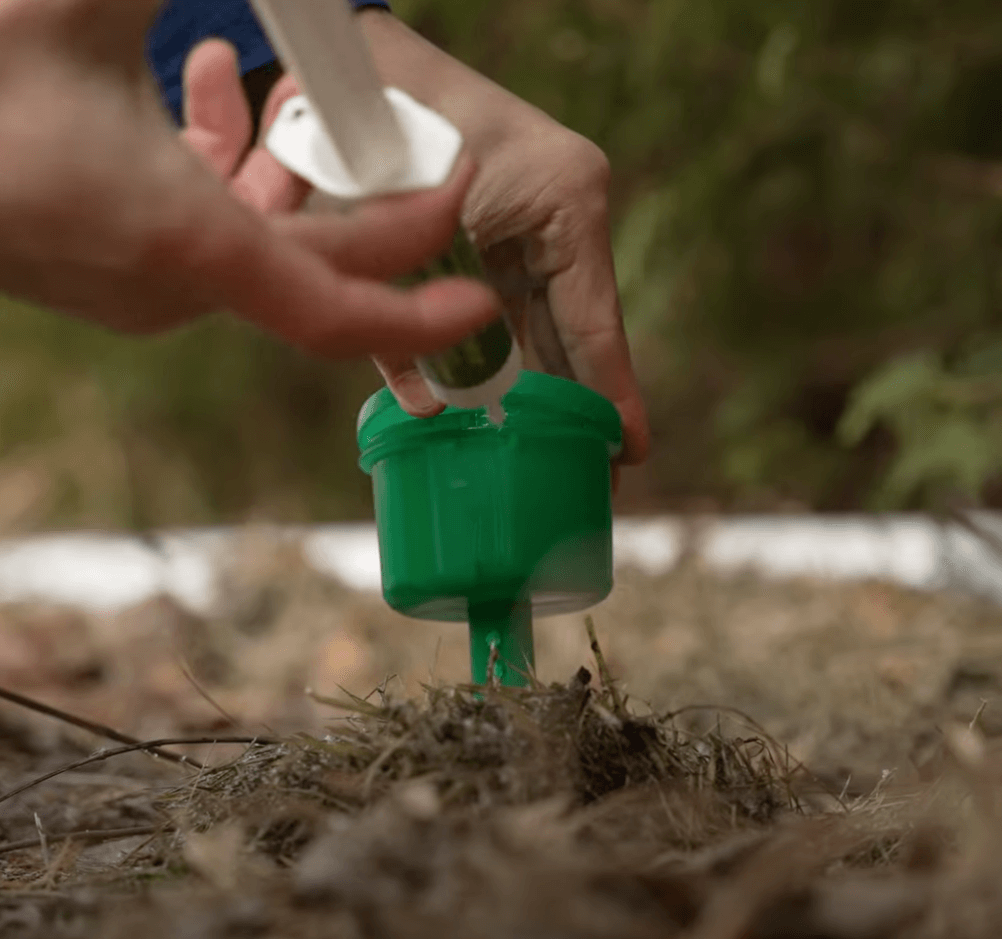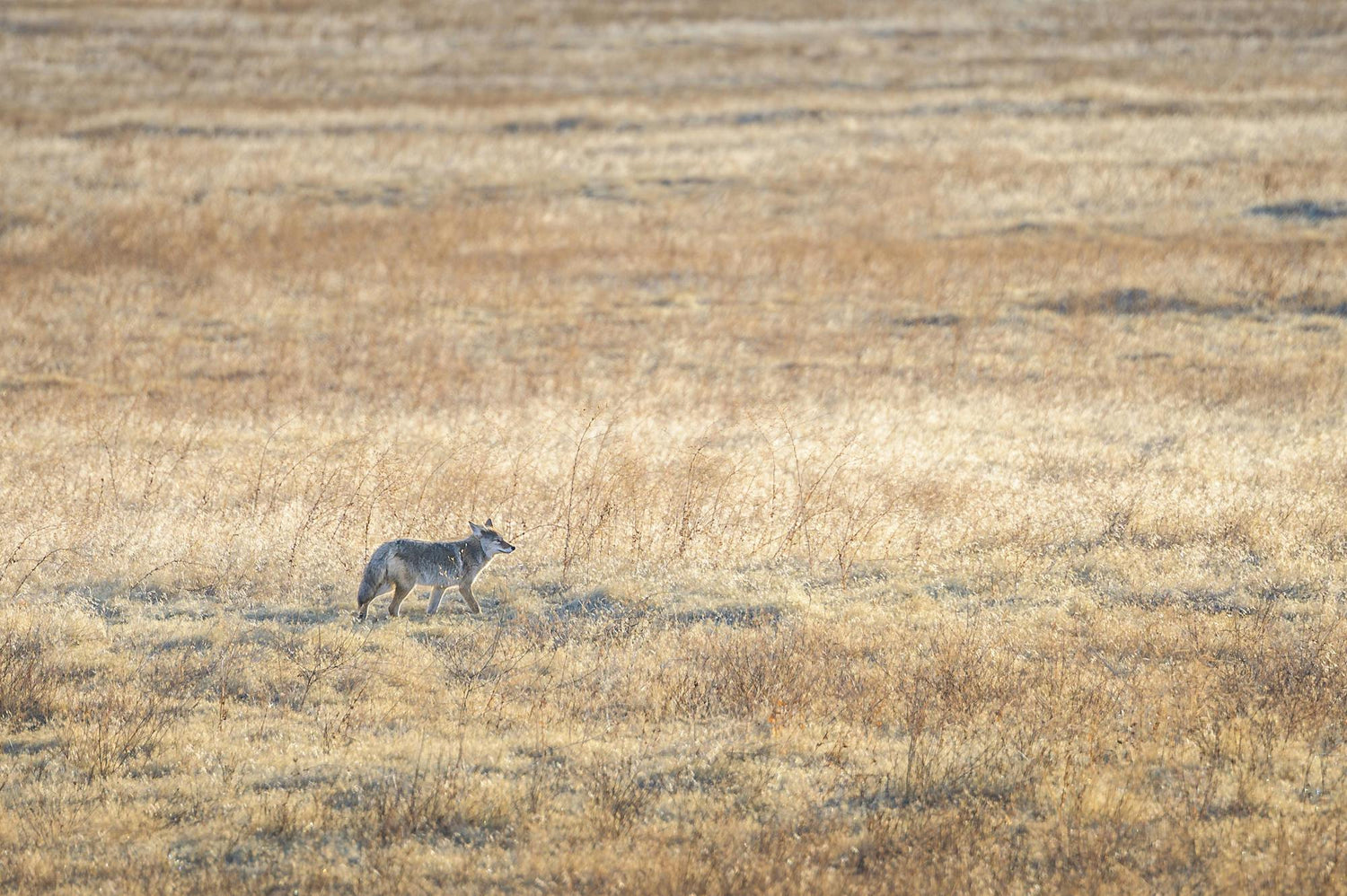
Signs of presence ⌵

General description ⌵

How to get rid of it ⌵

Dangers and damages ⌵
Signs of coyote presence
Coyotes are becoming more common in both urban and rural areas. They can be rather discreet neighbors, but there are several signs that indicate their presence around your property.
1. Distinct vocalizations
Coyotes are known for their howls, whines, and barks, often heard at night or at dusk. These sounds are used as a means of communication with each other and to mark their territory. If you hear these noises regularly, it is likely that a group of coyotes is nearby.
2. Paw prints
Coyote tracks are similar to dog tracks, but they are smaller and often line up in a straight line. Unlike domestic dogs that “zigzag” as they walk, coyotes typically follow a more straight, linear path.
3. Excrement (scat)
Coyote scat is a good sign of their presence. It is often twisted and contains hair and bones, evidence of their carnivorous diet. You may find these droppings in plain sight on trails or edges of land .
4. Fur or marks on fences
Sometimes, tufts of coyote hair get caught on fences or bushes as they pass through residential areas. If you find clinging hair or claw marks on your outdoor furniture, it could be a sign that a coyote has been there.
5. Missing pets or livestock
Coyotes can attack small animals like cats, dogs, or poultry. If your pets seem agitated or disappear without explanation, a coyote may be the cause of these unfortunate incidents.
General Description of Coyotes
Coyotes (Canis latrans), also called prairie wolves or brush wolves, are members of the Canidae family, native to North America. They are often compared to wolves, but are smaller and have a gray-brown coat often with reddish highlights around the face and legs. Coyotes stand about 2 feet (60 cm) at the shoulder and typically weigh between 20 and 50 pounds (9 and 23 kg), with size variations depending on region and food availability.
The coyote is known for its great adaptability. Originally, it lived primarily in the prairies and deserts of the western United States, but it quickly colonized diverse environments, including urban and suburban areas, where it coexists with humans. Opportunistic, the coyote feeds on a wide range of prey such as small mammals (mice, rabbits), birds, insects, and even fruit, depending on the season and food availability. Although it may occasionally attack livestock or domestic animals, the majority of its diet in urban environments remains small rodents and fruit.
Socially, coyotes are flexible: they can live alone, in pairs, or in small family groups. They are monogamous and pairs can remain together for their entire lives. Their vocal interactions are also remarkable, as they communicate through high-pitched howls and barks, used to mark their territory or stay in contact with group members.
Coyotes have an average lifespan of 3 to 6 years in the wild, although some individuals can reach 10 years in more protected environments. Their survival is often threatened by road collisions, hunting, and diseases such as rabies and mange in some areas.
How to Prevent Coyote Encounters in Canada: Practical Tips
Landowners in Canada have a responsibility to minimize the risks associated with coyotes by limiting attractions on their properties and adopting strategies to deter these animals from entering their properties. Canadian law prohibits the use of poisons or adhesives to capture or harm coyotes, even for property protection purposes. Here are some practical tips to keep your property safe and prevent conflicts with these wild animals.
Reduce Attraction to Coyotes
- Garbage and food waste management :
- Store your trash in sturdy containers with locking lids to prevent coyotes from accessing them.
- Only put out garbage in the morning of collection day to minimize overnight exposure.
- Keep pet food indoors and avoid leaving food bowls outside.
- Use a closed compost bin instead of an open compost pile to avoid attracting unwanted animals.
- Management of fruit trees and vegetable gardens :
- Regularly pick up fallen fruit from trees and remove seeds from the ground that could attract coyotes.
- If you have a vegetable garden, use a sturdy fence or opt for greenhouse gardening to protect your plants.
Deterring Coyotes from Entering Your Property
- Install safety devices :
- Installing motion-sensor lights or automatic sprinklers can confuse coyotes and cause them to avoid your property.
- To protect desired spaces, opt for a 2-meter high fence that extends 20 cm below the ground to prevent coyotes from digging.
- Add a roller device to the top of the fence to prevent them from catching.
- Maintaining the surroundings of your home :
- Clear away dense brush and weeds around your home, which could provide hiding places for small animals that are prey for coyote.
- Block off access under porches, decks and sheds, as these spaces can become potential dens.
Protecting your pets
Although coyotes generally avoid humans, they may attack small, unattended pets. Here are some steps you can take to protect your pets:
On your property :
Keep your dogs indoors at night, when coyotes are more active, and pick up after your pets, as droppings can attract coyotes. It may also be a good idea to have your dog spayed or neutered to avoid attracting coyotes looking for mating partners. Finally, install a proper fence to prevent incursions.
What to do if you encounter a coyote?
If you see a coyote, keep your distance. These animals are usually fearful and will avoid you. However, if you find yourself facing an aggressive coyote, do not turn your back or run. It is important to remain calm, make yourself appear larger by waving your arms, and make noise while slowly backing away.
Adopting these simple measures will allow you to effectively prevent encounters with coyotes and protect your property and animals while respecting local wildlife.
The dangers and damage caused by coyotes
Coyotes, although generally secretive, can pose safety risks to humans and pets when they lose their fear of humans or when they are attracted to accessible food sources in residential areas.
Health and safety risks
Coyotes carry diseases such as rabies, which makes them extremely aggressive and can cause them to attack even in broad daylight. In addition to rabies, coyotes are often infested with parasites such as fleas and ticks, which can transmit other diseases to humans and pets. Coyote bites or scratches can cause serious injuries, especially to young children or unattended pets. It is important not to interact with an aggressive coyote and to slowly retreat while maintaining eye contact.
Material damage and impacts on domestic animals
Coyotes frequently cause problems in gardens and farms by raiding unsealed garbage cans and destroying fences to access food or to prey on small animals. Cats, small dogs, and poultry are particularly vulnerable to coyote attacks, especially at night or early in the morning. Coyotes that are accustomed to finding food near homes become less fearful, which can lead to more frequent encounters and increased risks for pet owners.
In short, although coyotes are generally discreet and fear humans, they can sometimes become aggressive for various reasons, including rabies, and attack us. It is therefore important to remain vigilant and use preventive measures on your property.
With the purchase of a reusable half-mask respirator , get a 10% discount on the 3M vapor cartridge .
Discount code: 6TZJ
de rabais
10%
With the purchase of a Webster Cobweb brush , get a 10% discount on the Webster Cobweb extendable pole .
Discount code: DTSQ
de rabais
30%
With the purchase of a FlowZone backpack sprayer , get a 30% discount on complementary FlowZone products .
Discount code: A29B
de rabais
25%
With the purchase of the Catchmaster Ovi-Planter Ago mosquito trap , get a 25% discount on an Ungava brand mosquito repellent .
Discount code: UH5T
de rabais
25%
With the purchase of the Catchmaster Ovi-Catch Ago mosquito trap, get a 25% discount on an Ungava brand mosquito repellent .
Discount code: UH5T
de rabais
15%
With the purchase of the Envirolights JR fly light trap , get a 15% discount on the Catchmaster Flylight JR sticky panel .
Discount code: ZN7G
Best Sellers
-
ANSWER PRO Catch and Release Skunk, Trap for Skunks and Other Large Wild Animals 30.5"x 8"x 9.5"
Regular price $96.00 USDRegular priceUnit price per -
ProPest, Professional Bait for Mice, Rats, and Other Rodents
Regular price $8.00 USDRegular priceUnit price per -
HAVAHART EASY SET, Trap for Large Wild Animals 32''X10''X12''
Regular price $96.00 USDRegular priceUnit price per -
Provoke Professional Mouse Trap Gel Bait 56G/2OZ PR2092
Regular price $8.00 USDRegular priceUnit price per
Wild Animal Blog

Find your solution
Do you have a pest in your home but you don't know what solution to use to get rid of it? Just answer a few questions, and you will get your solution.










